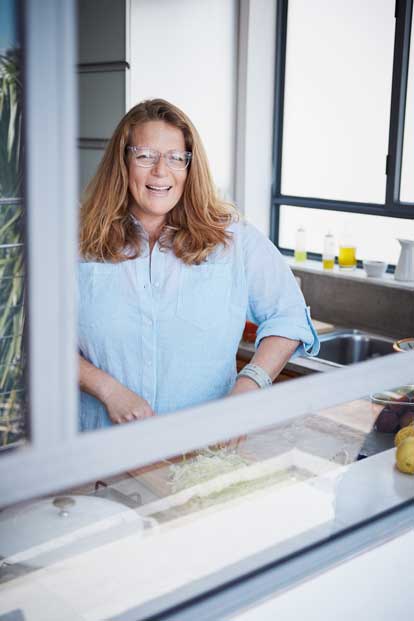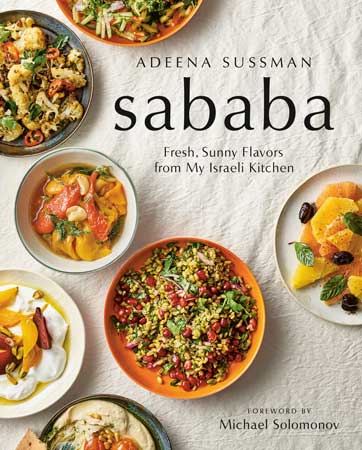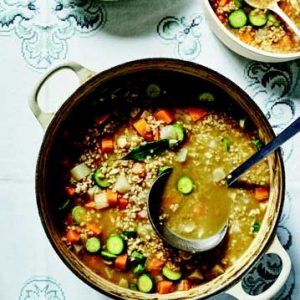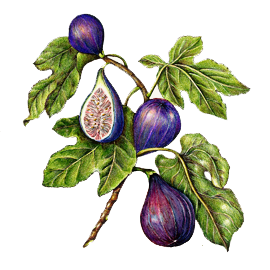Adeena Sussman knows what you want to eat. Tapping into others’ gastronomic yearnings is her superpower. She’s done it with numerous co-authors including Chrissy Teigen, with whom Sussman partnered for Teigen’s bestselling cookbooks Cravings and Cravings: Hungry For More. In Sababa, Sussman’s first solo effort, the food passions are her own. Sababa is Israeli slang meaning everything’s wonderful, and after you’ve had a look and a taste, you’ll agree.

More than just a cookbook, Sababa is a celebration of Israeli cuisine. What sets Sababa apart from books by Yotam Ottolenghi and Michael Solomonov is the way Sussman captures the region’s sunny flavors and spirit for the home cook.
Recipes are clear, simple and doable for the most part, relying on bright flavors like garlic, lemon, sumac, olive oil, and Israeli condiments like pomegranate molasses and zhoug— an herb-intense chili sauce that’s good on everything. Sussman provides recipes, but they’re sold commercially, too. Yes, Sababa includes a recipe for hummus — two, actually — but along with the tahini and chickpeas comes a delicious backstory about how to achieve hummus that’s hakosem (Hebrew for magical). Not all recipes are vegan, but plenty are, and not in a Hey-you-won’t-believe-this-is-vegan way, it’s just how they’re made, like her freekah and vegetable soup.
Sussman was born in California, but Tel Aviv has become her true home — it’s where she lives with her husband and it’s where she shops. Sababa is her love song to the shuks, the local markets where she shops daily, as much for the community as the wares. As she writes, “I shop the shuk for produce the way some scour racks for clothes, poring over a table of greens for the frilliest kale, the chard with the loveliest shade of green, the spinach with the most beautiful tapered blossoms. I end up with arms so full that I get home and start cleaning and separating leaves from stems, eager to cook down the bounty so the rest can fit, albeit tightly, in the fridge.” Swoon. Greens. Sussman knows what I want to eat, that’s for sure, and how I want to shop and cook — preferably with her. Until that happens, Sababa is the next best thing.


Freekeh Vegetable Soup
Ingredients
- 1 cup freekeh cracked or whole
- 3 tablespoons extra-virgin olive oil plus more for drizzling
- 1 large onion diced
- 1 medium kohlrabi rind and tough outer membranes peeled off, diced
- 2 medium carrots diced
- 1 teaspoon kosher salt plus more for seasoning
- ½ teaspoon freshly ground black pepper plus more for seasoning
- 3 garlic cloves minced
- 8 cups vegetable or chicken broth plus more if needed
- 2 medium zucchini diced
- 1 Parmesan rind or 1 tablespoon nutritional yeast optional
- 2 teaspoons chopped fresh za’atar or oregano
- ¼ teaspoon cayenne pepper or more to taste
- Chopped fresh herbs za’atar, parsley, chives, or scallions, for garnish
Instructions
- Place the freekeh in a medium bowl, cover with cold water, and set aside.
- Heat the olive oil in a large (4- or 5-quart) saucepan over medium heat.
- Add the onion and cook, stirring, until softened, 8 minutes.
- Add the kohlrabi and carrots and cook, stirring, until the vegetables begin to soften, 5 minutes; season generously with salt and black pepper.
- Add the garlic and cook 1 more minute.
- Drain the freekeh, rinse it with cold water, and add it to the pot.
- Add the broth, zucchini, Parmesan rind if using, za’atar, salt, and the cayenne. Bring to a boil, then reduce the heat and simmer, uncovered, until the soup is thickened, 25 to 30 minutes (or a few minutes longer if you’re using whole freekeh instead of cracked freekeh).
- Remove the Parmesan rind, season with more salt and black pepper to taste, divide among bowls, garnish with herbs, and drizzle with olive oil.

Leave a Reply